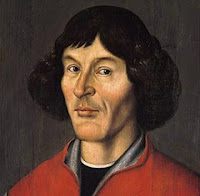 |
| Nicolaus Copernicus |
Physics has been, for the last seven centuries, the queen of sciences: its object is the study of the lowest-level of reality; its most akin to mathematics; it has seen happen the highest number of new, spectacular and revolutionary theories and discoveries. Let's see a few of them:
- 13th century: Roger Bacon studies reflection, refraction,
spherical aberration and the use of lenses to correct vision defects. He
also suggests the possibility of building telescopes, microscopes, and
flying vehicles.
- 14th century: Jean Buridan, Nicolás Oresme, Albert of
Saxony and the calculators
of Merton College revolutionize Mechanics, separating it for the first
time from the work of the Greek philosophers, and introducing new concepts
such as impetus.
- 16th century: Copernicus proposes replacing Ptolemy's geocentric
system by a much simpler heliocentric system. Kepler modifies the theory
of Copernicus and discovers the three empirical laws that bear his name.
- 17th century: Galileo perfects the telescope and makes with it
astronomical discoveries. He also recapitulates and organizes the
mechanical discoveries of the 14th century. Newton revolutionizes physics
with the theory of universal gravitation, which unifies terrestrial and
celestial mechanics, and makes great advances in optics. Other important
physicists of that century are Pascal, Huygens, Boyle, Mariotte, and many
more.
- 18th century: Although it's possible to detect a certain slowdown
in scientific research, we can mention the Bernoulli brothers, and near the
19th century, Galvani, Volta and Laplace.
- In the 19th century, discoveries in theoretical and experimental physics and the number of professional physicists increased dramatically. Let's mention just a few of the most important: Dalton, Faraday, Ampère, Gauss, Maxwell, Carnot, Lord Kelvin and Boltzmann.
